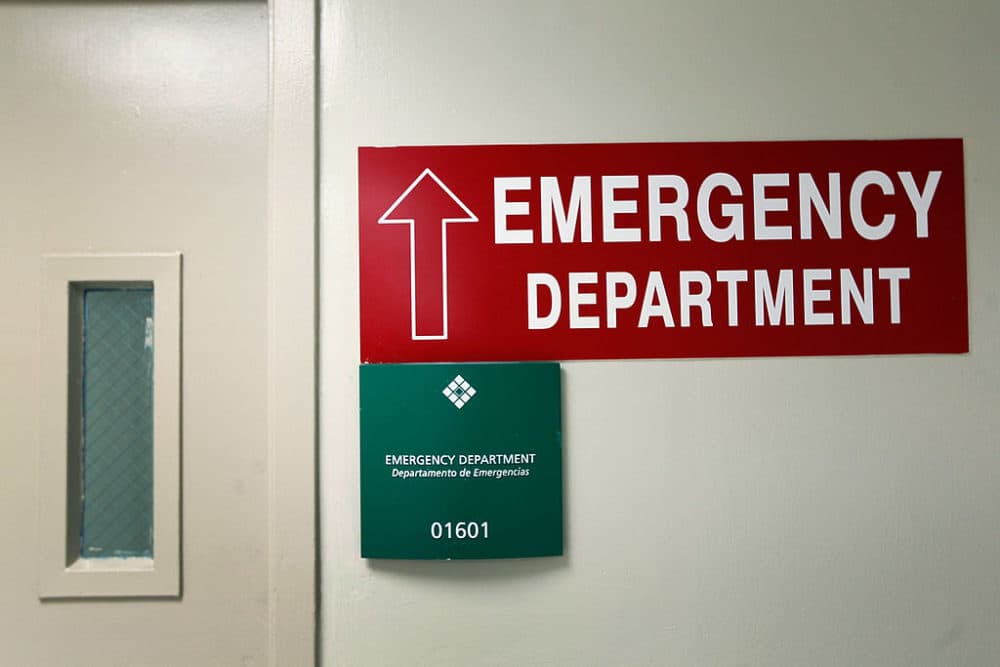Advertisement
Mass. Governor, Hospital Leaders Urge Patients Not To Fear Seeking Urgent Care
Resume
Heart attack and stroke symptoms left untreated until it's too late. Leg ulcers and blood vessel disease left to fester until limb amputation is the only option. Awful abdominal pain from a ruptured appendix endured for days before medical help is sought.
These are examples of what Gov. Charlie Baker and Massachusetts hospital leaders today warned is looming as a "second toll" of the pandemic: complications and even deaths resulting from delays in seeking medical care driven by fear of catching the coronavirus.
The state’s hospital system is finding that it can handle the current surge of COVID-19 cases along with other patients, Baker emphasized. “They have the capacity and the skill set to safely treat you,” he said at a briefing Thursday, “and I think it’s really important you understand that.”
Public service announcements urging people to seek prompt medical care will begin airing on all Boston TV stations today, Baker said.
Three hospital leaders at the briefing described disturbing drops in the numbers of patients seeking care for serious conditions — and, in some cases, severe consequences.
Tufts Medical Center has seen a 60% drop in patients seeking care for stroke symptoms, CEO Dr. Michael Apkon said, and overall the emergency department is seeing only about half the traffic it normally would in April.
Some stroke patients are coming in too late for medications to help, he said; some patients with kidney disease wait so long that by the time they come to the hospital they are "too sick to be cared for and survive"; some children are brought only after enduring the abdominal pain of a ruptured appendix for days.
"It is true that we are quite busy caring for patients with COVID-19," Apkon said. "But we have growing concern about what we're not seeing. We're not seeing the same number of patients coming to our emergency departments with strokes, with heart attacks, with traumas."
Dr. Gregg Meyer, chief clinical officer for Partners Healthcare, said that Newton Wellesley Hospital treated 5,400 patients in its emergency room in January, but over the last 31 days that number dropped by almost half to 2,800, and nearly half of the people who did seek treatment were COVID-19 patients.
"We need to avoid the second toll of the pandemic," he said. "One for which we do have treatments that work, one that we can control."
The hospital leaders acknowledged that social distancing, including reduced vehicle traffic, could explain part of the drop, but said it cannot explain a drop in urgent medical needs arising from chronic conditions like heart disease.
"Last year, our hospital treated an average of 20 stroke cases each month," Meyer said. "So far this month, we've seen only seven. There's no medical reason that I can come up with that states that stroke should be dramatically impacted by social distancing."
Patients are also trying to stay home despite worsening blood vessel disease, he said. "One of my surgeons said to me last week that he has done more amputations in the last few weeks than he can ever remember," he said, adding that the patients all had the same story: they knew they needed care but wanted to avoid coming in to the hospital. "Because of that," Meyer said, "we were not able to provide them with limb-sparing treatment."
Baystate Medical Center President Nancy Shendell-Falik said the situation is similar in the western part of the state, including a sharp recent decline in patients seeking treatment for stroke symptoms that is now translating into "lifelong debilitating consequences." An emergency department that normally sees 120 children per day is now seeing 25 or 30, she said.
In some cases, Shendell-Falik said, patients whose surgery was postponed because of the crisis see a change in their condition but think they are just on "perpetual hold" until the hospital calls them; others are told to come but don't.
"If your provider recommends that you come to the hospital, please heed that warning," she said. "We are safe and we are here for you."
This article was originally published on April 23, 2020.

